Christian Nodal, the tattooed mariachi: ‘It became cool to be Mexican’
Five years ago, no one knew him. He posted a video on Facebook and everything changed. Christian Nodal came from the Sonoran desert and became the representative of Mexican regional music, a genre that is conquering audiences in the US, Latin America and Spain
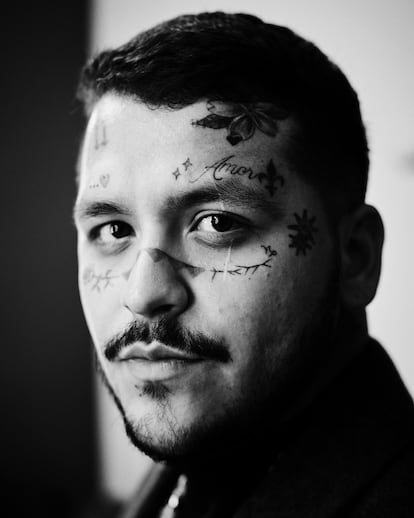
Christian Nodal’s grandfather Ramón taught him to write poems. As a boy, he watched the man surrounded by napkins where, pen in hand, he sought inspiration in the Pueblo Viejo plaza in the center of the small Mexican city of Caborca. “He concentrated hard, he tried to analyze life, and I wondered, ‘what is this man doing?’” Nodal remembers today, many years later. One day, the man set his grandson to practicing. “He taught me to write rhymes. We read them out loud and then, when I started to understand, he said, ‘Try to make sure that what you write is always as honest and pure as possible.’” The grandson never forgot that. He started writing like crazy.
Christian Nodal smiles now when he remembers “Abuelito Ramón” and his napkins. He is grateful for the poetry lessons: it was just another pastime in “a part of the desert where there’s nothing to do,” as he says. The Caborca-raised musician has become the continent’s latest musical phenomenon. He emerged from the deep Sonoran desert, and he made a name for himself after posting videos on Facebook. In just over five years, the young singer became a star of Mexican regional music, a genre that is overtaking new audiences like a storm. Now, he competes with current urban music icons like Bad Bunny, Rosalía, Karol G and J Balvin. Like those streaming champions, several of Nodal’s songs have over 300 million plays on Spotify and even more on YouTube. And he has crossed borders, allowing mariachi and northern Mexican sounds to conquer enormous audiences in the rest of Latin America, in the United States and even in Spain. Who is Christian Nodal? What is behind this man whose grandfather taught him to write?
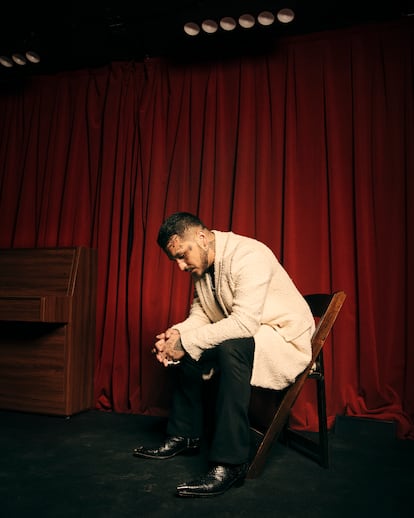
It’s a sunny morning in Madrid, and Nodal shows up with a group of five people, including two bodyguards the size of wardrobes. The other cafe customers ask themselves about the identity of the man with the entourage of a president or Hollywood star. In Spain, Nodal still can go unnoticed, but not in Mexico, where 90,000 people attended one of his last concerts, in the city of Hermosillo. Not just that: he made so much money that at 21 years old, he already had a private jet and a Ferrari, and he made himself a set of gold teeth in the style of Madonna and Justin Bieber. He belongs to the new royalty of pop in Spanish, that select group of the latest reggaeton and urban music stars that are exploding on social media and streaming platforms. Hee previously dated the Mexican singer Belinda, and his current girlfriend is Cazzu, a successful Argentinean trap artist, friend of Rosalía’s boyfriend Rauw Alejandro. The two couples spent New Year’s together in Japan. Despite the tattoos all over his face, and many others across his body —”I’m really tatted up, and I don’t know how many I have,” he says— Nodal comes off as shy and polite.
Nodal grew up as the oldest of three siblings in a home where music was always present. His father, Jaime, was an orchestra director and had his own artist management agency, where he represented the musician Ariel Camacho. He spent more time on the road than at home, but when he was in Caborca, he and his wife, Silvia Cristina, performed songs together in a group that they called Luna y Song. “They brought me along to play the cowbell,” Nodal laughs.
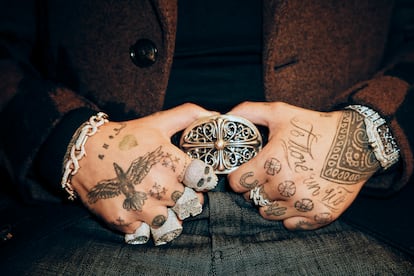
The Nodal family organized cultural events and celebrations in Caborca. Nodal’s uncles Iván and José played in an orchestra, and they taught him to sing and play the trumpet. “I grew up as a trumpet player. The music industry has no idea what a trumpet player they lost when they made me sing! I was really good at it, and I loved it.” Nodal remembers well the moment when he decided to sing for the first time: it was during a school event on Mother’s Day. “In class, I said that I would sing for my mom. I thought it was cool, but I didn’t know what I had gotten into! No one knew how I sang because I never opened my mouth. I didn’t want to do it but my mother forced me to.” He sang “Doce Rosas” by the singer Lorenzo Antonio. “I thought I had made a fool of myself. But the next day, girls started chasing me at school. And I thought, ‘Not bad. I want to do this for a living,’” he remembers with a chuckle.
That’s when the writing came in. Nodal was a bad student. All he did in class was write poems. His elementary-school notebooks were full of rhymes. “I was a lazy student, but when the teachers checked my work, they saw my poetry and said, ‘Okay, but at least he writes. He’s not learning anything, but he’s inspired,” Nodal says. “I was a kid that didn’t know anything about life, and I was already kind of dark,” he adds. That dark child began to grow up because his mother was epileptic. “When she had attacks, I tried to turn around the bad things. I would take my siblings out and make them play,” he said. “I remember holding my mom’s hand, trying to make those moments less aggressive. You never get used to it. It was really difficult to see her singing or cooking and then suddenly fall to the ground. That terror didn’t leave my head.” And he adds, “Music saved me from being more traumatized.”
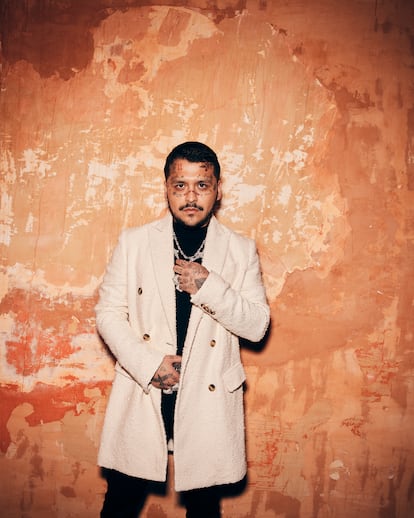
Music arrived, and the Nodals went far away from home. They moved to Las Vegas when Christian was 12. “Las Vegas may be fun for adults, but not for a kid,” he says. He met and befriended other Latinos in middle school, but he couldn’t attend high school. “It was really sad and kind of racist, because we tried many times. I ended up talking to the wall,” he explains. He decided to help his mother at home and take care of his siblings. As he had lots of free time, he began composing songs. He tried to sing the rhyming verses that he wrote with his grandfather. When he was 16, they returned to Mexico, moving to Ensenada, Baja California, after Ariel Camacho died. Without friends and obsessed with the guitar, Nodal discovered his country’s regional music.
“When I listened to regional music, I didn’t like it,” Nodal recalls. “I listened to Concha Buika, who my mom liked, and I thought regional singers were all drunks.” Ariel Camacho’s death made him more interested in the Mexican sounds that his father worked on, and overnight, Camacho became his model to follow. He also grew interested in musicians like Marco Antonio Solís and Joan Sebastian, and he decided to post a homemade video of one of his songs on Facebook. Many people in Caborca shared it. A few weeks later, he posted some more. Facebook went crazy over “Te Fallé,” a ranchera song about heartbreak, which went viral. “The algorithm was drunk,” he said. He got almost a million views in a short time. “I cried out of happiness and excitement, but my life didn’t change. We didn’t have money.” His father didn’t want him to become a musician, because, he said, it was a very frustrating field. Nodal spent almost a year trying to convince him to take him to a studio to record a song. Finally, his father agreed, but only when his son had composed four songs. “I showed up a few days later with my four shots,” Nodal says. His father saved money and asked other musicians for favors, and in 2016, they went to Hugos Studios in Los Mochis, Sinaloa.
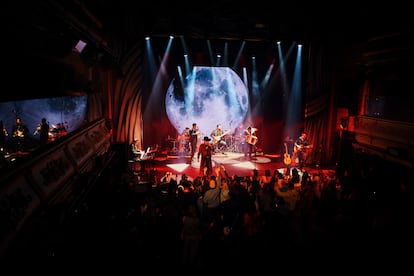
Nodal is known as the creator of mariacheño, a style that combines mariachi and norteño sounds. He gave that name to the style he recorded on his first days in the studio. “I liked norteño music because of Ariel Camacho, but my mother insisted that I record mariachi, people like José Alfredo, Jorge Negrete, Pedro Infante, but I saw it as old people’s music.” Mariachis play in Jalisco, but not in the north, Nodal’s home. So he played mariachi music and added accordion and trumpets to represent the music of the north. The song was “Adiós Amor.” “We all knew immediately that it would be good. We returned home in the car listening to it over and over. My mom said: ‘You’re going to win a Grammy with this.’” What he won was an incredible leap; every day he got more than 200,000 views on YouTube. Universal signed him a few months later, in 2017, and had him sing alongside David Bisbal on “Probablemente.” By then, “Adiós Amor” had 80 million views. Since then, the numbers have continued to climb on his albums Me dejé llevar, Ahora and Ayayay!
Nodal has shown up at the appointment in Madrid without his characteristic mariachi hat. He likes to step out of the stereotype. It’s part of the key to his success: he isn’t like any other mariachi singer, nor is he just another urban phenomenon. He has one foot in tradition and another in the modern world, to the point that he spends time with pop and reggaeton stars like Juanes, Sebastian Yatra, Maluma and Camilo. But he knows that he’s the newest novelty of a style that has always had good ambassadors and has reached the hearts of many people. “Mariachi fits in in many countries,” he says. “I love how it’s sung, and unlike corridos, it’s more romantic and lets you dance. But I make unisex songs. I don’t want to be an alpha male and sing like they sang before. I want to open the path for the vulnerable men. Men need to stop being so proud.”
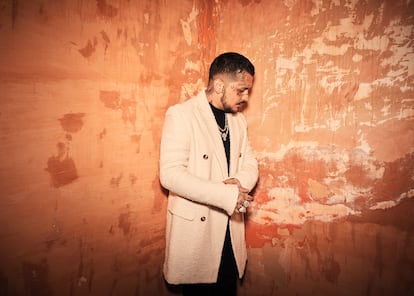
Reggaeton, a genre long accused of misogyny, has also taken that path of “unisex songs” to adapt to the times and reach global audiences. And on streaming platforms, the numbers of Mexican regional music continue to grow. The genre has particularly taken off in the United States, due to its enormous Mexican population, as Nodal has proved on several tours. As Martín Fabian, CEEO of Nueva Generación Music Group, Inc., a leading company in artistic development in Latin America, “Mexico and the United States have always been a natural corridor for music. Now a phenomenon is taking place: the children of immigrants pay more attention to Mexico because of social media and technology.” He adds, “Latin America is being seduced by this sound. Young people see it as something new and different from tropical music.”
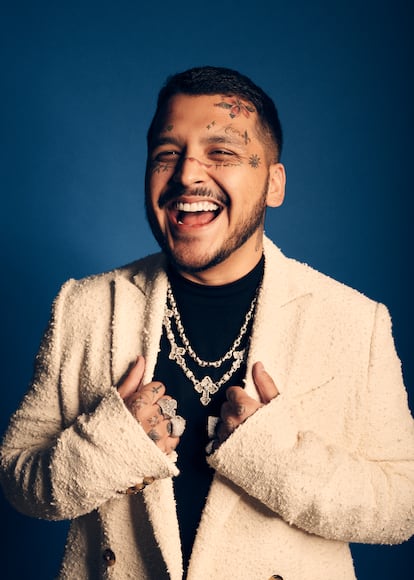
A case in point: Bad Bunny just surprised everyone with “Un x100to,” his collaboration with the Mexican band Grupo Frontera. It’s not the first time that Bad Bunny forays into the genre: in 2019 he released “Soy el Diablo,” with the Mexican singer Natanael Cano. Since then, the corrido tumbado genre, which comes from Natanael’s album of the same name and takes elements from trap and reggaeton, has grown more popular. “It became cool to be Mexican. The new generation of regional music has captivated young people,” says Nodal, who has become the Mexican representative of the music and is on his way to becoming a global star. His tattooed face still has a childish air, reminiscent of that little boy who wrote his first poems on a paper napkin.
Sign up for our weekly newsletter to get more English-language news coverage from EL PAÍS USA Edition
Tu suscripción se está usando en otro dispositivo
¿Quieres añadir otro usuario a tu suscripción?
Si continúas leyendo en este dispositivo, no se podrá leer en el otro.
FlechaTu suscripción se está usando en otro dispositivo y solo puedes acceder a EL PAÍS desde un dispositivo a la vez.
Si quieres compartir tu cuenta, cambia tu suscripción a la modalidad Premium, así podrás añadir otro usuario. Cada uno accederá con su propia cuenta de email, lo que os permitirá personalizar vuestra experiencia en EL PAÍS.
¿Tienes una suscripción de empresa? Accede aquí para contratar más cuentas.
En el caso de no saber quién está usando tu cuenta, te recomendamos cambiar tu contraseña aquí.
Si decides continuar compartiendo tu cuenta, este mensaje se mostrará en tu dispositivo y en el de la otra persona que está usando tu cuenta de forma indefinida, afectando a tu experiencia de lectura. Puedes consultar aquí los términos y condiciones de la suscripción digital.









































